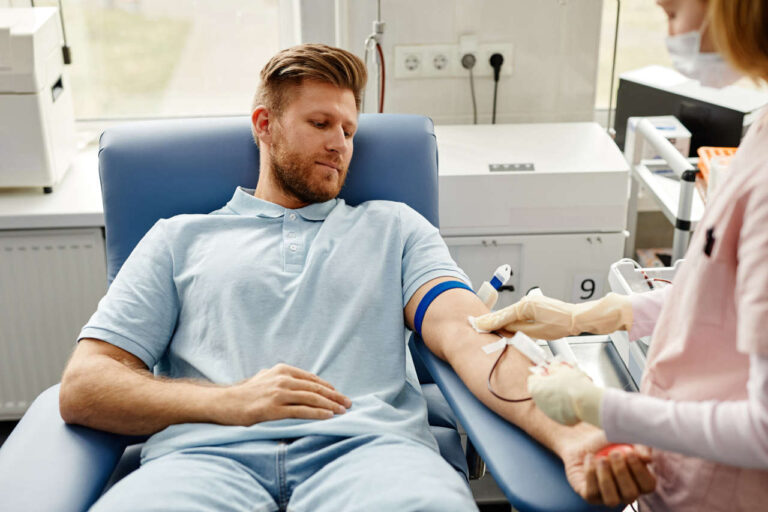
Medicare provides coverage for IVIG and SCIG therapies in many instances, but navigating the details can sometimes be difficult. This guide will provide an overview of how IG therapies are covered under Medicare.
Medicare will provide coverage for IVIG based on:
- The diagnosis
- The location of therapy
- The route of administration
Diagnosis codes and other criteria are used to determine whether IVIG is covered by Medicare Part B. If you have a condition that is not covered by Part B, you may still be covered by Medicare Part D if your condition is listed as an FDA-approved IVIG indication.
Speak to a IVIG Specialist
Medicare IVIG Coverage Under Part B
IVIG is covered under Medicare Part B if the following criteria are met:
- IVIG is administered at home.
- IVIG is administered through an infusion pump.
- The treating physician has determined that the administration of IVIG at home is medically appropriate.
- The patient is diagnosed with primary immunodeficiency disease with one of the diagnosis codes listed below.
Medicare-covered Diagnosis Codes for Part B:
| Code | Description |
| D80.0 | Hereditary Hypogammaglobulinemia |
| D80.2 | Selective deficiency of immunoglobulin A (IgA) |
| D80.3 | Selective deficiency of immunoglobulin G (IgG) subclasses |
| D80.4 | Selective deficiency of immunoglobulin G (IgG) subclasses |
| D80.5 | Immunodeficiency with increased immunoglobulin M (IgM) |
| D80.6 | Antibody deficiency with near-normal immunoglobulins or with hyperimmunoglobulinemia. |
| D80.7 | ICD-10 diagnosis code for transient hypogammaglobulinemia of infancy. |
| D81.0 | Severe combined immunodeficiency (SCID) with reticular dysgenesis |
| D81.1 | Severe combined immunodeficiency (SCID) with low T-and B-cell numbers |
| D81.2 | Severe combined immunodeficiency (SCID) with low or normal B-cell numbers |
| D81.5 | Purine nucleoside phosphorylase (PNP) deficiency |
| D81.6 | Major histocompatibility complex class I deficiency |
| D81.7 | Major histocompatibility complex class II deficiency |
| D81.9 | Combined immunodeficiency, unspecified. |
| D81.89 | Other combined immunodeficiencies |
| D82.0 | Wiskott-Aldrich syndrome |
| D82.1 | DiGeorge syndrome. |
| D82.4 | ICD-10 diagnosis code for hyperimmunoglobulin E (IgE) syndrome. |
| D83.0 | Common variable immunodeficiency with predominant abnormalities of B-cell numbers and function |
| D83.1 | A billable/specific ICD-10-CM code that can be used to indicate a diagnosis for reimbursement purposes |
| D83.2 | Common variable immunodeficiency with autoantibodies to B- or T-cells |
| D83.8 | Other common variable immunodeficiencies |
| D83.9 | Common variable immunodeficiency, unspecified |
| G11.3 | Cerebellar ataxia with defective DNA repair |
Can IVIG help?
Free IVIG Treatment Info | Difficulty In Diagnosing?Medicare will pay 80% of the drug cost. The other 20% must be covered by a supplemental plan or by the patient. Under Part B, only the drug cost is covered. Supplies and infusion pumps are not covered unless they are for CIDP.
For CIDP, Medicare will also pay for 80% of the cost of supplies and infusion pumps. As of July 2021, only subcutaneous IG therapy (such as Hizentra and Hyqvia) for CIDP is covered under Part B.
Medicare IVIG Coverage Under Part D
For diagnoses that are not covered under Part B, Part D coverage may apply if the condition is an FDA-approved IVIG indication (see below).
Medicare-Covered FDA-approved Indications for IVIG
- Primary immunodeficiency
- Myasthenia gravis
- Chronic inflammatory demyelinating polyneuropathy (CIDP)
- Immune thrombocytopenic purpura (ITP)
- B-cell chronic lymphocytic leukemia (CLL)
- Stiff-person syndrome
- Bone marrow transplant/hematopoietic stem cell transplant
- Dermatomyositis
- Polymyositis
- Multifocal motor neuropathy
- HIV infection
- Guillain-Barre syndrome
- Lambert-Eaton myasthenic syndrome
- Parvovirus B19-induced pure red cell aplasia
- Kawasaki syndrome (pediatric)
- Fetal/neonatal alloimmune thrombocytopenia
- Isoimmune hemolytic disease of newborn
- Neonatal hemochromatosis
- Immune checkpoint inhibitor-related toxicity
- CAR-T therapy-related hypogammaglobulinemia
- Acquire red cell aplasia
- Acute disseminated encephalomyelitis
- Rasmussen encephalitis
- Enteroviral meningoencephalitis
- Autoimmune mucocutaneous blistering disease
- Autoimmune hemolytic anemia
- Autoimmune neutropenia
- Systemic lupus erythematosus
- Birdshot retinochoroidopathy
- BK virus-associated nephropathy
- Churg-Strauss syndrome
- Hematophagocytic lymphohistiocytosis (HLH)
- Macrophage Activation Syndrome (MAS)
- Hyperimmunoglobulinemia E syndrome
- Multiple myeloma
- Opsoclonus-myoclonus
- Post-transfusion purpura
- Solid organ transplantation
- Major surgery associated secondary immunosuppression
- Hematologic malignancy-associated secondary immunosuppression
- Major burns associated secondary immunosuppression
- Collagen-vascular disease-associated secondary immunosuppression
- Toxic epidermal necrolysis
- Stevens-Johnson syndrome
- Toxic shock syndrome
- Toxic necrotizing fasciitis
Standard Part D benefit and copay structures apply.
For more information on out-of-pocket expenses for Part D, visit the Q1Medicare site.
Nursing Costs for IVIG

Nursing costs for IVIG are covered under the Original Medicare or Medicare Advantage plan. For Original Medicare, 80% of the costs will be covered by the plan, and either a supplemental plan or the patient will be responsible for the remaining 20%.
Costs will vary under Medicare Advantage. A full benefits investigation is necessary to determine the exact cost. Speak to an AmeriPharma™ billing specialist for more information.
Consult an AmeriPharma™ Billing Specialist
Medicare IVIG Demonstration Project
The Medicare Intravenous Immune Globulin (IVIG) Demonstration Project is designed to assess the benefits of providing compensation for materials and services required for in-home IVIG administration for the treatment of primary humoral immunodeficiency.
In this demonstration, Medicare Part B will give coverage for supplies and services required to provide immunoglobulins in the home to the registered beneficiaries who are not otherwise bedbound and receiving home health care aids. The demonstration is solely for beneficiaries who require IVIG for the treatment of PIDD or who presently use subcutaneous immune globulin (SCIG) to treat PIDD and want to transition to IVIG.
Eligibility criteria for participation in IVIG Demonstration
To participate in the IVIG Demonstration, a recipient needs to meet the following requirements:
- Must be registered for Medicare Part B and be covered by Medicare Fee-For-Service.
- Must have a confirmed diagnosis of primary immune deficiency disease (PIDD).
- Must not be currently receiving home health care.
Copay Assistance
AmeriPharma™ offers assistance to help with any remaining copay you may have on IVIG after using Medicare. Using advanced software, AmeriPharma™ will review all available funding sources and match you with a program that fits your needs. A copay specialist will help you with the application process.
For more information, speak to one of our specialists about how AmeriPharma™ can help.
How to Enroll in Medicare
You may sign up for Medicare online, by phone, or in person at your local Social Security office.
Medicare enrollment is available during a 7-month enrollment period that starts 3 months before you turn 65. You must enroll in Medicare prior to turning 65 if you want your coverage to start on the month you turn 65. You may also enroll in Medicare up to 3 months after the month you turn 65, as outlined on the Medicare website.
For more information, visit medicare.gov.
Get IVIG Copay Assistance
IVIG Financial AssistanceFAQs
Does Medicare cover IVIG for CIDP?
Yes. For CIDP, Medicare will pay for 80% of the cost of the drug and supplies. The other 20% must be covered by a supplemental plan or by the patient. As of July 2021, only subcutaneous IG therapy (such as Hizentra and Hyqvia) for CIDP is covered under Part B.
Does Medicare cover IVIG for Guillain-Barre syndrome?
Yes. Medicare provides coverage for Guillain-Barre syndrome under Part D.
Does Medicare cover IVIG for Myasthenia Gravis?
Yes. Medicare provides coverage for Myasthenia gravis under Part D.
Is Privigen covered by Medicare?
Yes, Privigen (J1459) is covered under Medicare Part B.
Is Gamunex covered by Medicare?
Yes, Gamunex (J1561) is covered under Medicare Part B.













